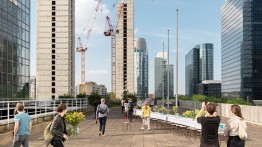Current Work | 51N4E: How Not to Demolish a Building
Tuesday, April 11, 2023, 7 - 9pm

51N4E | Rooftop WTC3, Brussels, Belgium, 2021. Image credit: Sepideh Farvardin
This event will be conducted in-person only. Registration is required, please register in advance here.
Founded in Brussels in 1998, 51N4E is, in its own words, “a self-steering collective that wants to empower people to be both autonomous and connected.”
The practice consists of three independent, but interconnected studios: Acte, Cast, and Root. Acte focuses on adaptive infrastructure and civic design. Cast investigates the possibilities of large-scale urban structures, open public space, and collective housing. Root integrates architecture and ecology, exploring the relationship between nature and buildings, and between humans and their environment.
Recent projects include:
- Skanderbeg Square, a redesign of the symbolically complex central square of Albania’s capital city
- ZIN in No(o)rd, a new 14-floor volume that connects two existing towers in Brussels, radically expanding the structure’s programmatic possibilities
- Noord Zuid Limburg, an innovative transport infrastructure plan for a province in northern Belgium.
51N4E won the 2018 European Prize for Urban Public Space and was a finalist for the 2019 Mies van der Rohe Award.
The lecture will be presented by Olivier Cavens and Dieter Leyssen.
Olivier Cavens is a studio agent for 51N4E’s Cast studio. He holds a bachelor’s and master’s in architectural engineering from the University of Ghent.
Dieter Leyssen is a partner and cofounder of 51N4E’s Acte studio. He holds an MArch from Catholic University Leuwen and a master’s in city design and social sciences from the London School of Economics. He currently teaches at Catholic University Leuwen and Hasselt University.
This program will be moderated by Elisa Iturbe. Iturbe is an assistant professor at The Cooper Union, where she is organizing the lecture series Architectures of Transition and the exhibition Confronting Carbon Form.
Support
This program is supported, in part, by public funds from the New York City Department of Cultural Affairs in partnership with the City Council, and by the New York State Council on the Arts with the support of the Office of the Governor and the New York State Legislature.
The event is co-sponsored by The Architectural League of New York.
Tickets are free for Cooper Union students and faculty with valid ID, and League members.
Located in The Great Hall, in the Foundation Building, 7 East 7th Street, between Third and Fourth Avenues




